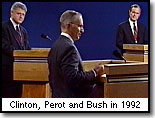Political Debates


The teacher will guide the process as the entire class generates a list of hot topics for debate. Next, a master list is constructed and the teacher gives a "rough sketch" account of arguments on both sides of a given issue. Students are then organized into 2 or 3 person debate squads based on their desire to be on a particular side. Sometimes it is not possible to accomodate students in their first choice. Students will be encouraged to be flexible and have choices in reserve. Only rarely will a student need to be assigned to a debate squad by the teacher. The schedule of debates will be established by a random drawing. All groups are required to have all research and preparations (final drafts of opening statements, questions, and closing statements) completed ahead of time. All groups will have the same due date. It would be tremendously unfair, in terms of assigning grades, to give certain debate teams an advantage by allowing uneven preparation time.
Each member of a debate squad will have the same responsibilities:
1. To make an opening statement. It must be memorized. One minute minimum; 2 minutes maximum. Opening statements should demonstrate a well-balanced approach to public speaking; including appeals to Logos, Ethos, and Pathos. They should also attempt to set up or frame the opposition if at all possible. Remember: A good opening statement is like the beginning of a good book; provide a "hook" to pull the audience into the "story"; introduce the main "characters" in your story; and leave them with a "zinger"--wanting to hear more!
2. Be ready to go head to head with the opposition. Each debator should be prepared with a minimum of 6 specific questions for the other side. Obviously, you should be ready to field difficult questions from the opposition. These questions need to be prosecutorial in nature. In other words, your questions should be designed to make the "other guy" dig deep to justify their position. Make the opposition squirm in their seats. Don't be simplistic. Expect the other side to "fire right back" with counter questions. Everyone is required to ask two questions (6 must be written in preperation ahead of time). Hint: Higher grades are always achieved by demonstrating personal initiative. (i.e. Step up without being prompted by your teacher. Be an aggressive interrogator).
3. Be ready to answer questions from the audience. When you aren't up front taking part in a debate you will be ready with 6 questions for the debate scheduled for a particular day. These questions will be homework during the week of debates and will be checked before the each debate begins. The students in the audience are graded for participation and so are the participants. Again, showing initiative is the key to attaining the best possible grade. This session can get "ugly" from time to time so look out and be prepared. Your teacher will have hard questions for both sides during this session so don't be caught off guard.
4. Last, but not least, are closing statements. Time and memorization requirements are the same as in #1, above. A good closing statement should remind the audience of the main points your side made during the debate. Then find a creative way to help the audience remember your side. The best closing statement usually goes one step beyond. How? Through the inclusion of impromptu supporting evidence that was reaped in the heat of "battle" with the opposition. Tell the audience how your reasoning "rocked" the other side by reminding them of a specific example of an argument your side won while going head-to-head.
Note: You will be recieving a grading guidelines sheet for each and every debate, even the practice rounds.
Mr. Orr will actually debate his "alter ego" to personally illustrate/demonstrate the above-mentioned debate elements. Last year Mr. Orr conducted an entire debate against himself as he worked both sides of an issue; the right of radical groups to protest.
Checklist for Political Debates Course
Here are the Contents of Your Folder.
Part I: Defending the Republic Against the "Antagonist". Click here to learn more.
__6 questions for speaker #1. __6 questions for speaker #2. __6 questions for speaker #3
__6 questions for speaker #4. __6 questions for speaker #5. __6 questions for speaker #6
__6 questions for speaker #7. __6 questions for speaker #8.
I was a member of the special committee for the questioning of the speaker on __________.
__8, one page, summaries of each speaker. In order of appearance in class.
Part II: Debates on Current Political and Social Issues
__Debate Responsibilities Guidelines Sheet, List of Expectations & Requirements.
__Notes on the 3 Means of Persuasive Oratory (Logos, Pathos, Ethos).
__List of Debate Topics Generated in Class and Your Original Ranking of Them.
__Debate Preparation Notes. Minimum of 2 Full Pages.
__Helpful Hints for Debators: Fill-in Worksheet/Notes.
__Minimum of 6 Questions for Each Debate Squad (Prepared for the days when your group is
in the audience)
__Completely Filled-out Debate Grading Guidelines Sheets (for all debates other than your
own)
My Debate Topic was:
Side: PRO or CON (circle one) My Partners' Names were:
Here are some links that will be helpful:
www.greyhawkes.com/ps/parties.html
Here you will find a list of the political parties active in the United States
today.
www.gksoft.com/govt/en/us.html An
increadible number of links to US Government Offices, domestic and foreign.
www.politicalinformation.com/ Here you
will find an extensive search engine devoted to politics, political issues and political
news.
www.politics1.com/states.htm Here you
will find a portal to political issues and organizations on the State Level.
http://snoopy.tblc.lib.fl.us/utlibrary/polisci.htm
Link to a broad variety of political/government sites.
www.library.ucsb.edu/subj/politica.html
This is a very thorough political science resource Page.
www.vote-smart.org/issues/ Topical links
to research the major political and social issues of our time.
www.gallup.com/ A Poll Site. www.zogby.com Another Good Poll Site.
www.hillwatch.com/hotissues/HotissuesHome.htm
A Good Web Site for researching today's hottest political issues.